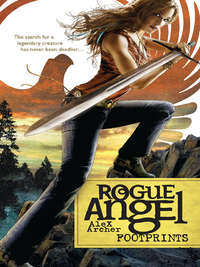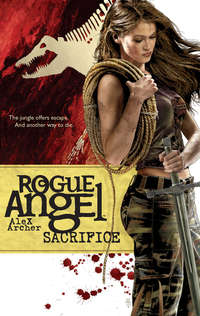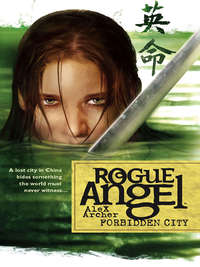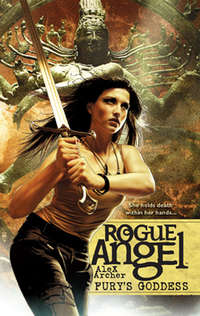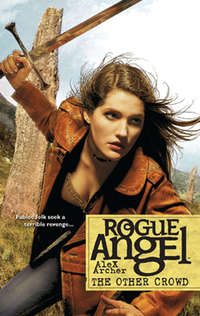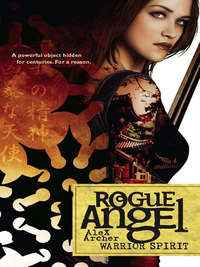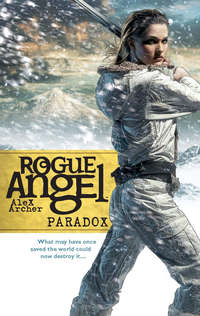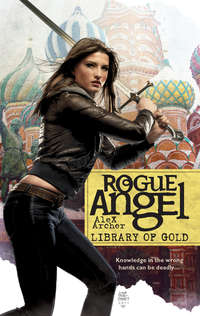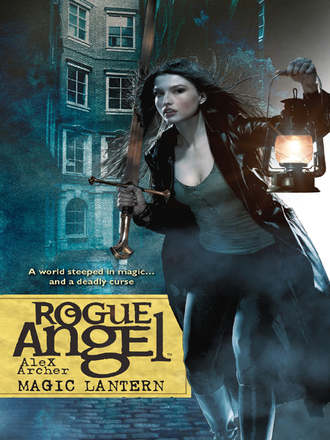
Полная версия
Magic Lantern
Annja loved every moment of the shows, from the theatrics to the conversational patter that established the history and the obvious familiarity the men and women all had with one another.
“If you’ll excuse me, I’ll return shortly.” Edmund left the table and headed for the kitchen area.
Gaetano kept Annja enthralled with stories about his adventures as a magician. He also kept the wine flowing and managed small sleight-of-hand tricks with dinnerware, napkins and coins between magic acts.
Then the stage curtain parted and Edmund passed through. He no longer wore the old-fashioned suit. He was dressed in a swimsuit and carried swim goggles in his hand.
Instantly, the dining area filled with catcalls and good-natured teasing.
“I see you’ve got nothing up your sleeve, Professor Beswick!”
“And chicken legs.”
Edmund held up his hands in surrender. “Go ahead, mates. Take your shots. Make them the best you can, because I’m about to amaze and astonish you.”
After a few more catcalls and hoots of laughter, the crowd settled into an expectant hush.
“Tonight I’m going to attempt my grandest escape ever. As many of you know, I’ve been studying to become something of an escapologist. I’m going to perform this escape in honor of my guest—Ms. Annja Creed of Chasing History’s Monsters and something of an escape artist herself, according to the stories I’ve read about her.”
An enthusiastic burst of applause followed the announcement.
“Stand up. Let them see you.” Gaetano pushed back out of the spotlight that suddenly fell on Annja.
She stood, waved and bowed, and felt more than a little embarrassed. She sat back down and glanced at Gaetano. “Does Edmund bring all his dates here?”
Gaetano smiled. “You are the only person Edmund has brought here in all the years that he’s been coming.”
Flattered, Annja turned her attention back to the stage.
“You have all heard of the Great Houdini, and you have heard of the Chinese Water Torture Cell. Or, as the master himself called it, the Upside Down.” Edmund stepped back and swept a hand toward the stage.
The curtains parted and a large glass-and-steel box filled with water was revealed. A beautiful young woman walked out of the shadows. Like Edmund, she wore a swimsuit, except hers was a spectacular yellow bikini designed to draw the attention of every male in the room.
Annja kept her focus riveted on Edmund. The assistant locked his feet into stocks, then operated a mechanical winch to lift Edmund off the stage floor, suspend him in the air and place him headfirst into the water tank.
Despite the fact that she knew the trick was part of a planned show, Annja tensed as she watched Edmund submerge. He put his hands on the glass, steadying himself as he went into the water. His hair floated around his face. She caught herself holding her breath with him and felt foolish.
A moment later, the assistant locked Edmund in. Once the woman stepped back, Edmund started working to free himself. At first, his movements were controlled, smooth and confident. Then, as time passed, he became more frantic. His hands slammed against the glass walls as he jerked and strained to pull free of the stocks.
3
“Something’s wrong.” Annja started to get up. She was already reaching for her sword, thinking that she could break the glass walls and release the water.
Calmly, Gaetano put a hand on her forearm to restrain her. “Relax. This is part of the show.” But he didn’t take his eyes from the stage.
Annja forced herself to sit, but she noticed that several of the other dinner guests were ill at ease, as well. She didn’t know how much time had passed, but she thought at least two minutes had gone by. Perhaps as many as three.
Abruptly, the assistant hurried forward and draped a bloodred curtain over the water tank. Maybe it was supposed to protect the audience from the horrid sight unfolding before them. Then the woman lifted an ax and prepared to strike.
The audience held its collective breath.
The only thing holding Annja in her seat was Gaetano’s firm, unshaking hand on her arm. And that wasn’t going to hold her back for much longer.
The assistant started her swing with the ax just as the curtain rose above the water tank. She dropped the ax and yanked the thick material away to reveal Edmund standing triumphantly on top of the locked water tank.
Annja released a tense breath as enthusiastic applause filled the dining room.
Dripping wet and looking magnificent, Edmund bowed theatrically. Then the stage curtains closed.
Gaetano smiled at Annja. “Now are you glad that I asked you to wait?”
“Yes, but that was nerve-racking.”
“It was meant to be. Magic is meant to confound or astonish. But really good magic, the kind like Houdini practiced, was more in line with a circus performance.”
“How?”
“An aerialist working without a net. A lion tamer sticking his head into a lion’s mouth. A motorcycle daredevil whirling madly inside one of those steel balls. And even someone who allows himself to be shot from a cannon. They all flirt with death. At least, they do to an untrained eye. But the reality is that even the best performers sometimes catch an unlucky break. The audience never truly wishes to see something like that, but the expectation is there that it could happen.”
“I suppose that doesn’t speak highly of us, does it?”
“We’re all human. What is life without spectacle? And risk?”
* * *
“I LOVE DOING MAGIC.” Edmund, dressed again in his tux, sat at the table and walked a euro across his knuckles. The coin flashed in the light. “Ever since I was a boy, I wanted to know how magicians did the things they did. So I worked at it.” He shrugged and smiled sadly. “Unfortunately, magic doesn’t pay much unless you get very good and very lucky.”
“Being good doesn’t always help.” Gaetano poured more wine all around. “Edmund, you are good. What you need is a dedication to your craft and luck.”
“So why didn’t you become a magician? The money?” Annja basked in the glow of the dinner, wine and company.
“I thought I needed a legitimate job. Something to fall back on. In addition to magic, I also loved stories. So I became a professor of literature.”
Gaetano threw his arm around the younger man. “Edmund is being modest, which is no way for any self-respecting magician to be. He attracted the attention of Oxford University and is now one of their shining lights.”
Annja grinned. “So I’ve been told.”
Gaetano shook his head. “Modesty ill becomes a magician. A performer of magic must be unique and daunting and commanding, while being extremely skilled at his craft. Edmund lacks the callous disregard for others that a magician must develop.”
“Appearing on Chasing History’s Monsters should help correct that.”
Gaetano licked his finger and mopped up graham cracker crumbs from the small dessert plate that had once contained an excellent blackberry cheesecake. “And that is precisely why I pressed him to agree to see you. Of course, that might not have happened, anyway, except for that little predilection of his.”
Annja was intrigued. “What predilection?”
“Oh? Usually he’s very prompt about mentioning it and the curse.”
Annja studied Edmund, who looked even more pained. “Now I’m curious.”
“Annja, you must be tired.”
She shook her head. “Not too tired to hear about cursed predilections. And I hate mysteries. If you don’t tell me, I’m going to be wondering all night.”
Edmund grinned. “Well, we can’t have that, can we?”
* * *
“WHAT DO YOU KNOW OF phantasmagoria?”
Annja walked beside Edmund as they strolled from Carlini’s Magic Bullet Club. Still feeling a warm glow from the after-dinner wine, she linked her arm through the young professor’s. “It was theater, kind of early film. Phantasmagorists projected images on walls—usually of supernatural creatures—and told stories about them. But that’s the extent of what I know.”
Cars whizzed by on the dark streets. Windows of closed shops caught their reflections as they passed. The wind held a chill and the fog had increased, but the weather was still pleasant enough.
“The images weren’t just shown on walls. They were also projected onto smoke and semitransparent surfaces, which created even more eerie effects. Phantasmagoria began in France in the late 1700s and spread all over Europe during the next hundred years. People do love being frightened.”
“The human culture seems to thrive on ghost stories. They address common fears and offer a backhanded belief in God.”
“If demons and monsters exist, then so must God?”
“Something like that.”
“You learned that in archaeology?”
“Anthropology, actually. All part of the same field.”
“Interesting.”
Annja patted him on the arm. She relished the conversation, and her curiosity about the young professor’s pastime remained unanswered. “This has something to do with your predilection?”
“Everything.”
“Good.”
“Phantasmagorists owed their success to the magic lantern.”
“That was made by the Chinese.”
Edmund grinned. “Not according to the phantasmagorists. They claim that Christian Huygens invented it in the mid-seventeenth century, and that Aimé Argand’s self-named Argand lamp made the device even better. However, I do know that the Chinese were the first to use lamps to project images painted on glass as storytelling devices. Actually, that comes into this story, as well.”
Annja continued walking and listening.
“Once the magic lantern was successfully designed, others were quick to use it. To backtrack a little, Giovanni Fontana, a physician and engineer and self-proclaimed magus, used a candle-powered lantern to project the image of a demon. The idea of the supernatural became a fixture when it came to the magic lantern.”
They paused at the street corner.
“Athanasius Kircher, a German priest, reportedly summoned the devil with his device. Thomas Walgensten called his projector a lantern of fear and used it to ‘summon ghosts.’ A man named Johann Georg Schopfer performed in his Leipzig coffee shop and summoned dead people, images projected on smoke. Later, he went insane—believed he was being stalked by devils and shot himself. He also promised he would raise himself from the dead.”
“I take it that didn’t happen.”
Edmund grinned and shook his head. “No.”
The streetlight changed and they crossed.
“The latter part of the eighteenth century and into the nineteenth century gave rise to the phantasmagorists. They began their craft in Paris, as I mentioned, but the use of magic lanterns spread quickly. At the same time, Romanticism and Gothic literature were growing. The timing for the magic lantern and the phantasmagorists, you might say, was dead-on.”
Annja rolled her eyes at the pun.
Edmund chuckled. “Suffice it to say, I am smitten by the whole splendor of the phantasmagorists and their lucrative entertainment. During the heyday of the shows, many hosted gatherings within the catacombs beneath Paris.” Edmund looked at Annja. “Can you imagine what that was like? There they were, deep under the city, and these phantasmagorists could make them feel as though they were walking through the bowels of hell itself.”
“That doesn’t sound like my idea of a good time.”
“Ever watch horror films when you were young?”
Annja smiled. “I did.”
“We take pleasure in tempting the dark, wondering if it will one day come out of hiding and pounce on us with a predator’s fangs.”
“Not me.” Annja had been there too many times.
“And yet, here you are, Ms. Creed, tracking a man who has savagely beaten and killed three women.”
Some of Annja’s good mood evaporated, though she knew Edmund hadn’t intended for it to. And he was right about her being there in spite of the danger. She was never drawn to the danger, but she was attracted to the mysteries and curiosities. “I’m not afraid of the man who killed those women.”
“I would prefer it if you were.”
“He’s just a man. The police will find him soon enough.”
Edmund nodded. “I hope you’re right. In the meantime, I’ll tell you about the particular magic lantern I have in my possession.”
4
“Anton Dutilleaux was a Parisian phantasmagorist in the late eighteenth century.” Seated at the small table in the tea shop not far from the hotel where Annja was staying, Edmund added milk to his tea and stirred. “Have you heard of him?”
“No.” Annja stuck with coffee and cupped her hands around her cup to absorb the warmth. She took a deep breath, enjoying the sweet baking smells.
“I can’t say I’m surprised. Rather, I would be flabbergasted—very much so—if you had heard of him.” Edmund reached into the messenger bag he’d brought with him from Carlini’s. He took out an iPad and placed it on the table. The screen flared to life.
Not many people were in the tea shop at that late hour, and none of them paid attention to Edmund and Annja. They were mostly watching the television in the corner of the room. The low rumble of the news and casual conversation was a comforting undercurrent of background noise.
Edmund touched the handheld device and opened a folder. He sorted through images, then selected one. Immediately, a taciturn man with slitted eyes filled the screen.
“Anton Dutilleaux. This image was used on several handbills that advertised his shows. He toured Paris for three years. I couldn’t find much history on him, no parents and no idea where he lived. I just know that he traveled.” Edmund sipped his tea. “And no one ever knew much about his murder.”
That heightened Annja’s interest. “He was murdered?”
Edmund nodded and grinned. “Intriguing, no?”
“It is.”
“According to a newspaper account of the murder, Dutilleaux was stabbed through the heart by a Chinese ghost in front of several eyewitnesses.” Edmund tapped the iPad screen again and shifted to a new image. “He was pronounced dead at the scene by a doctor in the audience. Do you read French?”
Annja nodded. “Mais, oui.” And she read on.
Phantasmagorist Slain by Celestial Spirit!
On the eve of the twenty-first of June, in the catacombs, M. Anton Dutilleaux, late of Paris and previously from parts unknown, met with an untimely end at the hands of a supernatural murderer. M. Dutilleaux was a phantasmagorist conducting a group comprising this reporter and several others through a dark and winding tunnel under the city at the time of his death.
The reporter described several of the events leading up to the murder. The account meandered, as stories did in those days because the news was meant to be savored and enjoyed and—in this case—puzzled over.
M. Dutilleaux had barely begun what was to be a fascinating presentation, this reporter is convinced of that, when the crafty killer sprang from the darkness. Merciless and without hesitation, the apparition brandished a knife and drove it through M. Dutilleaux’s heart with cold savagery, like a predator pouncing on much weaker prey. The stricken man had no opportunity to defend himself or call upon his Maker before he lay stretched out dead before us.
A few paragraphs of the reactions of the crowd, the panic that had ensued and the desperate attempts to revive Dutilleaux followed.
As of this morning when I write this piece for you, Dear Reader, the Parisian police have yet to decide who killed M. Dutilleaux. There are some who believe that the phantasmagorist was the victim of a Celestial spell that followed him from the Far East during his travels. Many readers this reporter knows believe in those curses. All I can tell you is that whatever killed the poor man was not human. I stared into that White Face of Death and knew fear the like of which I have never before known.
My only prayer is that the thing that killed M. Dutilleaux has completed its mission. Otherwise, that thing may yet haunt the catacombs. At present, the tunnel has been boarded up and placed under guard by the police until such time as they deem it safe.
Annja looked up at Edmund. “I assume you followed up on this story?”
The young professor nodded. “Of course. I’ve checked for months and years following. And I’ve gotten absolutely nowhere. No one ever mentioned Anton Dutilleaux again. Only a few magicians remember him. I wouldn’t have known him at all if I hadn’t discovered some of his handbills in a collection I purchased a year ago.”
“Two hundred years is a long time.”
“It is. But history has a way of making itself known, don’t you agree?” Edmund sipped his tea.
“Tell me about this lantern you found.”
Slipping his hands around his teacup, Edmund leaned conspiratorially across the table toward her. “Only a few weeks ago, I was at an estate sale.”
“Looking for the lantern?”
“No. Merely poking about. A lot of magicians have made their home—temporary and permanently—here in London. During my days off, I research those people. Occasionally I stumble across stage props or costumes while dissembling through estate sales.”
“Treasure hunting?”
Edmund smiled in pleasure. “When history is not valuable or fashionable, it is garbage and people toss it out. Or they sell it to speculators for pennies on the pound. I have assembled quite the collection of mementos and collectibles. Trust me when I say I have made several acquisitions that other fans of magic envy, and that no one else would want.” He shot her a rueful look.
Annja didn’t doubt him for a moment. Passion showed in Edmund’s dark eyes and she knew he wouldn’t easily turn away from something he wanted.
“Have you heard of Étienne-Gaspard Robert?”
Annja thought for a moment, then shook her head. “Another phantasmagorist?”
“Yes, but he was also an inventor and physicist from Liège, Belgium. His stage name was Étienne Robertson.” Edmund waited expectantly.
Annja shook her head again.
“Robertson, by either name, was one of the most important phantasmagorists who ever lived. I have copies of some of the lenses with which he used to conduct his magic-lantern shows. I can’t afford the real lenses, not on a university professor’s salary. Fascinating stuff. Especially for the time.”
“I’ll take your word for it.”
“Do. Anyway, Robertson was there the night Dutilleaux was murdered by the Chinese ghost.”
“Coincidence?”
“No. Robertson was there to take umbrage with Dutilleaux. Robertson felt certain Dutilleaux was copying aspects of his own magic-lantern show. Which I’m sure he was. But at that time, many people were copying Robertson.”
“Was Robertson a suspect in the murder?”
“Of course.” Edmund grinned, warming to the subject. “Robertson and Dutilleaux were rivals for a long time. But the murder occurred in 1793, four years before Robertson revealed his pièce de résistance at the Pavillon de l’Echiquier. That was when Robertson left his competitors in the dust, to use a colloquialism. During that time, Robertson perfected the magic-lantern craft by putting the projectors on wheels to create moving images as well as make the images larger and smaller simply by moving the projectors.”
Annja sipped her coffee.
“The police never found any evidence against Robertson?”
“No. But Dutilleaux’s magic lantern went missing that night. I believe that Robertson, or one of his assistants, liberated that projector while the gendarmes were en route. Or perhaps it was merely a spectator looking for a trophy. Or simply theft.”
“And the lantern was taken even though it was cursed.”
“Dutilleaux claimed that he could open a doorway into another world. Maybe they didn’t think the projector was cursed so much as it was truly a miracle.” Edmund smiled. “You have to remember—magicians, the really good ones, want magic to be real. Perhaps whoever took it believed the magic lantern possessed supernatural powers. Fast-forward two hundred years.”
Annja finished the last of her coffee.
“I was tracking down Robertson’s apprentices. There were dozens of them, by the way. In 1799, Robertson’s phantasmagoria show had created such a stir that the courts ordered him to reveal his secrets to the public. Once he did that, there were many imitators. Some of them carried phantasmagoria back to the United States. Did you know that?”
“No.”
“In May 1803, the first of the magic-lantern shows was presented at Mount Vernon Garden, New York, and the entertainment caught on readily enough.” Edmund looked into his cup.
For the briefest moment, Annja felt uncomfortable, like someone was watching her. She glanced around the teahouse, but no one seemed especially interested. It was too dark to see much out the window. She returned her attention to Edmund.
“The point is, I tracked down some belongings of one of Robertson’s assistants at auction those few weeks ago.” Excitement gleamed in Edmund’s eyes. “I think someone else was searching, as well, because after I bought the lot—for a song, practically—the auctioneer informed me there was an interested party asking about the lantern I’d bought. They told me I could more than double my money if I wished to sell it. Of course I refused. What I gave for the lantern was a pittance, and it was purely for my own amusement. Even doubling my money wouldn’t leave me a rich man.”
“So you now own Anton Dutilleaux’s cursed magic lantern?”
Edmund nodded happily. “I truly believe I do.” He hesitated. “What I’d like to ask, and I wouldn’t want to impose in any way, is if you could look this magic lantern over and see if there’s a possibility of authenticating it.”
“Confirming that it was owned by Anton Dutilleaux would be extremely difficult if the man is as hard to trace as you say he is.”
“He is, and I wouldn’t ask you to do that. If possible, I’d like to confirm the approximate age of the lantern.”
“I would love to.”
“Good.” Edmund checked the time on the iPad. “We’ll have to save that for another day, though. I have a literature class bloody early in the morning, and none of my students is especially keen on Beowulf. I don’t want to go dragging in looking like one of the underclassmen. But I had an absolutely brilliant time, Annja.”
“Me, too.”
* * *
EDMUND INSISTED ON WALKING Annja back to her hotel, then he flagged down a taxi and left, promising to see her the following afternoon so they could start working on the Robert Louis Stevenson piece.
Up in her room, still slightly muddled from the rich food and the wine but not quite drowsy enough to sleep, Annja exchanged the black dress for a T-shirt and flannel pajama pants. The room was just cold enough to make the flannel welcome.
She booted up her notebook computer and logged on to the internet. She checked Google for Anton Dutilleaux but didn’t get any hits on the name that had anything to do with magic lanterns or phantasmagoria.
Frustrated, but not surprised, Annja backtracked and bookmarked sites that dealt with phantasmagoria, magic lanterns and Étienne Robertson. At least that way she could meet Edmund Beswick on a more equal footing when they were together again.
Her sat-phone chirped for attention before her head hit the pillows. Caller ID showed it was Bart McGilley.
Bart was a longtime friend, a detective on the New York City Police Department and a guy who had ended up being a big part of her life—on and off. There was a definite attraction between them, and they’d been the “plus ones” for each other several times as well as going out on legitimate dates. However, the only permanent thing they had between them so far was friendship.
The caller ID picture showed Bart in his shirt and tie, which was how Annja usually saw him. He wore his dark hair cut short and was square jawed, the kind of guy women would want to have children with.


